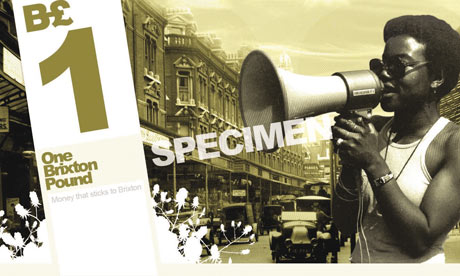Brixton's community cash
An area of London now has its own currency. Will the Brixton pound really boost trade and bring the people together?
-

- guardian.co.uk, Sunday 20 September 2009 15.00 BST

Photograph: Handout/PA
Totnes businesses were trading goods and services in Devon in their very own local currency 200 years ago. Now a facsimile of the 1810 note is part of the design for the modern-day version of the Totnes Pound. Local currency initiatives are popping up all over Britain. Totnes and Lewes, Sussex are the oft-quoted examples of local "pounds" already in circulation; and this week Brixton became the first urban community to launch its own currency: the Brixton pound.
Brixtonites were out in force to cheer in the new notes at the Lambeth Town Hall on Thursday. Local businesses supporting the initiative – there are over 70 of them – were present alongside interested locals. Walking around Brixton today, I could have bought a record from Blacker Dread Muzik Store, repaired my bike or even have had belly-dancing lessons with my brand new set of £1 and £5 notes.
Three months ago, I voted for Olive Morris to appear on new bills and it is hugely satisfying to hold five £1 notes bearing her image. On the other banknotes are Vincent Van Gogh, CLR James and James Lovelock.
The initiative encapsulates the sense of community that has long marked Brixton out from fellow London boroughs. It's nice to see it in the news for something other than gang shootings or drug dealing.
The Brixton pound is supported by all the key local businesses – both Caribbean and non-Caribbean – with the notable exception of Brixton Wholefoods, which turned down the offer, and The Ritzy cinema, which was keen to get involved but was prevented at the last minute by its owners, the Picturehouse. Lambeth council has been especially enthusiastic – there are even rumours of a Lambeth Pound, with Streatham and Kennington watching developments closely.
You can spend your Brixton pounds in any shop that accepts them and ask for them back in change. There are five exchange points at places likely to be frequented by a wide range of Brixtonians. Josh Ryan-Collins, an associate at the New Economics Foundation, emphasises the importance of "encouraging businesses, not just consumers, so that they trade with each other to reduce carbon emissions".
This isn't just a Brixton thing, or even just a Britain thing. In the UK, the campaign is part of a movement called Transition Towns. They have drawn inspiration from local currencies all over the world. The Berkshires in upstate New York led the way; there is a growing movement in New Zealand; and Germany has 29 active local currencies – the so-called Regionalgeld – and 38 to come. Worldwide, people are starting to return to local cooperative models.
These inspiring global precedents are all very well but only 800 residents have signed up in Brixton, an area with over 65,000 residents. The overwhelming response from Brixtonians at the Town Hall – not the now-converted businesses – was interested bemusement. The desire for localism is there, but will the pound actually make a difference?
There has been no official evaluation of the economic impact of local pounds in Totnes or Lewes. A staff member at the Lewes cafe, Bills, said that they take in roughly £600 a week in the currency, but still "it hasn't made a difference to our business personally, although I know that lots of smaller businesses are keen to promote it." County Carpets in Lewes have only taken in a few hundred pounds this year. What is generally agreed upon, however, is that, if not a direct financial help, it has raised awareness about the importance of local shopping and the pound sign in the window always attracts punters.
One major difficulty for the urban scheme is that local traders often do not use suppliers from London, let alone from Brixton. The Brixton pound team answer the sceptics with their "cheerful disclaimer" – they don't have a damn clue if it will work either. Josh Ryan-Collins admits that it will be an "enormous awareness-raising exercise" to convince traders to keep supply chains within the area, but he is confident of the strength of their viral marketing It seems unlikely that the Brixton pound will make a major difference to business – but even if it doesn't lift the area out of the recession it certainly won't drag it down. And if it creates community cooperation and an awareness about shopping locally and sustainably, done with creativity and fun, then indeed, why not?
- guardian.co.uk © Guardian News and Media Limited 2009
No comments:
Post a Comment